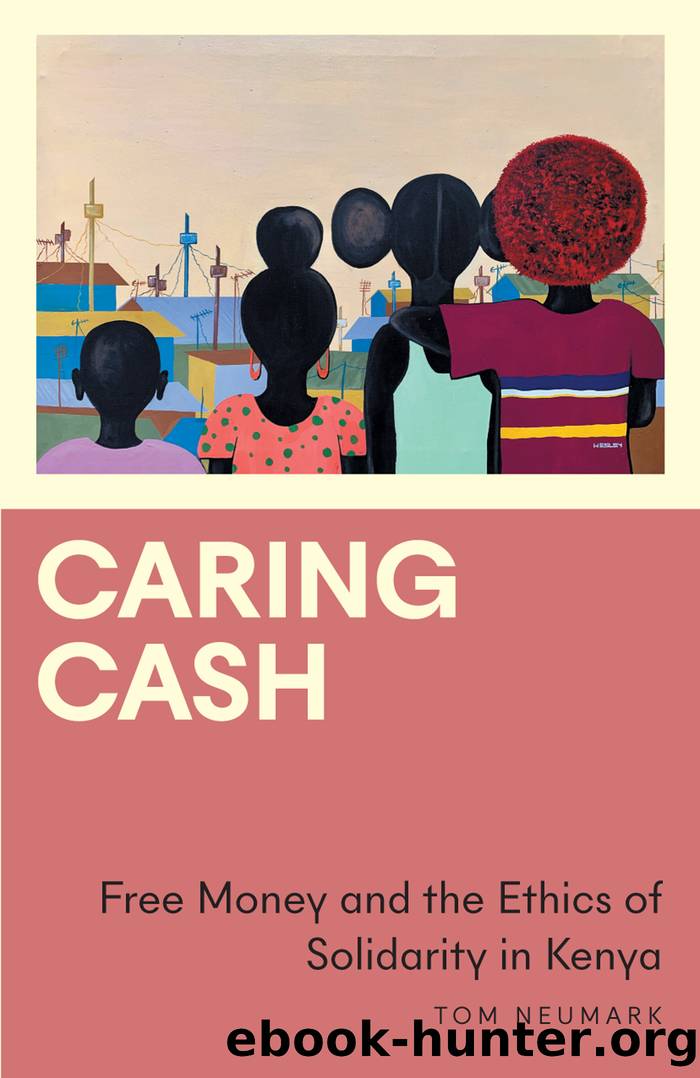Caring Cash by Tom Neumark

Author:Tom Neumark
Language: eng
Format: epub
Publisher: Pluto Press
PART II
3
Under the Aegis of Mistrust
Anthropologists studying what is often particularly familiar to them, including bureaucracies, have drawn attention to the problems of studying those knowledge practices and forms that are shared between the anthropologists and interlocutor (Riles 2001; Ballestero 2019). Drawing on Maurice Blochâs observation that certain types of more familiar expertise, such as scientific ones, have not been the privileged object of anthropological enquiry, Marilyn Strathern argues that certain more esoteric practices are âmore likely to dazzle than othersâ. To be dazzled, she suggested, is to be afforded the impetus for further analysis and revelation (Strathern 1999, 10â11). In my own fieldwork, I similarly came across things both in the grants and the wider charitable economy that were overtly familiar: meetings, documents, policies, algorithms, and the other material infrastructures that characterise bureaucratic worlds.1 Unable to be dazzled by such objects, anthropologists have approached them in different ways. Often this has meant an ethnographic attentiveness to what jars, from the odd invocation of kinship in high finance (Riles 2004) to the ways our interlocutors see the mundane in ways that are unfamiliar to us (Ballestero 2019).
My own fieldwork around the bureaucracy of the cash grants posed a very different problematic. While prepared, because of my familiarity with diverse forms of development and humanitarian interventions, to see the conventional bureaucracies and their knowledge practices, I was taken aback by their relative absence in the cash grants. That is, studying as I was an attempt to build a social assistance system, I was surprised when the bureaucracy I was expecting rarely seemed to materialise. Expecting to regularly sit in on and observe meetings relating to the grants, I was instead met by their sporadic occurrence. The intensive bureaucracy involved in the registration process of the urban grant, explored in the previous chapter, was, as I quickly discovered, somewhat of an anomaly. After the recipients had been identified and registered, on the whole they, along with those on the urban grant, seemed to be left alone by the charitable, bureaucratic apparatus. The cash payments would arrive either, in the case of the urban grant, in the recipientâs mobile money account, or, in the child grant, in their Posta account. Repeatedly during my fieldwork, I was struck by the absence of workshops, or training sessions, or even the individual surveillance of grant recipients. This was in stark contrast to activities associated with other programmes that I sometimes encountered during my fieldwork, for instance, the distribution of food in a malnutrition clinic or a legal aid camp for residents at the Chiefâs Camp.
When it came to the cash grants, the bureaucrats who are conventionally involved in these, and who had been involved, albeit in a minimal capacity, in the survey processes, were effectively stood down. Existing bureaucratic hierarchies within the charitable economy were being flattened out, reversed, and even, by eschewing the intermediary, hollowed out. Missing in the grant programmes, then, were those sites â traditional in the bureaucratic apparatus common to both governmental
Download
This site does not store any files on its server. We only index and link to content provided by other sites. Please contact the content providers to delete copyright contents if any and email us, we'll remove relevant links or contents immediately.
International Integration of the Brazilian Economy by Elias C. Grivoyannis(111059)
The Radium Girls by Kate Moore(12028)
Turbulence by E. J. Noyes(8049)
Nudge - Improving Decisions about Health, Wealth, and Happiness by Thaler Sunstein(7707)
The Black Swan by Nassim Nicholas Taleb(7129)
Rich Dad Poor Dad by Robert T. Kiyosaki(6632)
Pioneering Portfolio Management by David F. Swensen(6301)
Man-made Catastrophes and Risk Information Concealment by Dmitry Chernov & Didier Sornette(6019)
Zero to One by Peter Thiel(5802)
Secrecy World by Jake Bernstein(4753)
Millionaire: The Philanderer, Gambler, and Duelist Who Invented Modern Finance by Janet Gleeson(4478)
The Age of Surveillance Capitalism by Shoshana Zuboff(4292)
Skin in the Game by Nassim Nicholas Taleb(4249)
The Money Culture by Michael Lewis(4207)
Bullshit Jobs by David Graeber(4190)
Skin in the Game: Hidden Asymmetries in Daily Life by Nassim Nicholas Taleb(4007)
The Dhandho Investor by Mohnish Pabrai(3765)
The Wisdom of Finance by Mihir Desai(3747)
Blockchain Basics by Daniel Drescher(3583)
